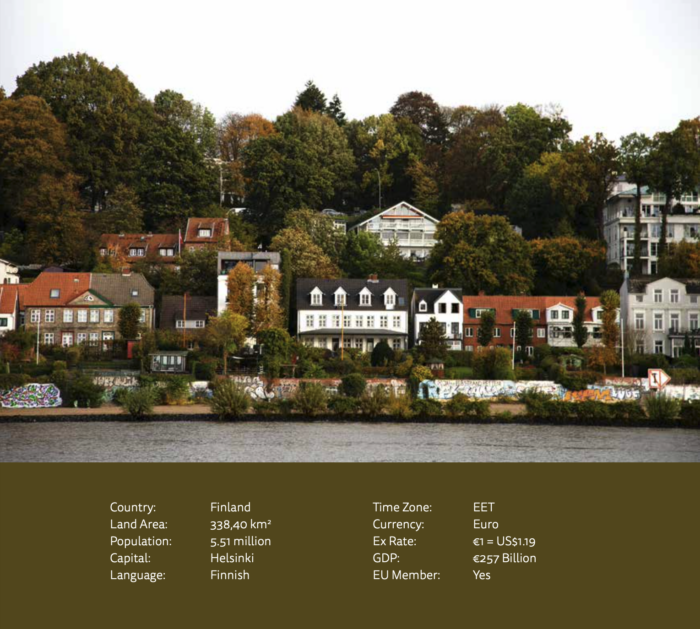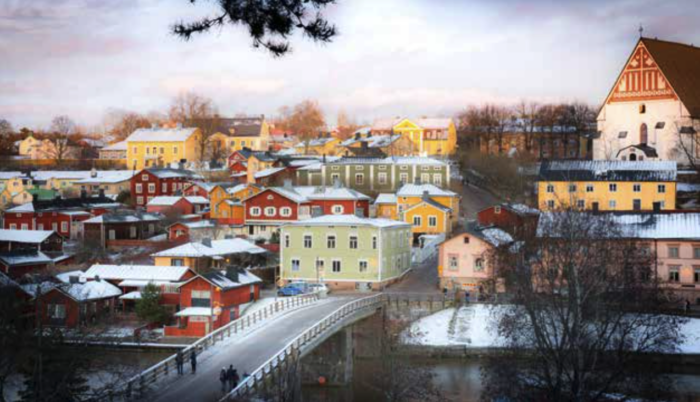Until the 12th century, Finland was a political vacuum but both its neighbours, Sweden to the west and Russia to the east were interested in taking over. Sweden was the more dominant power as the peace treaty of 1323 shows. This gave only an assigned portion of eastern Finland to Novgorod and the western and southern parts were tied to Sweden. At this time, Swedish laws and social structure began to gain a foothold as did the Catholic Church. The Reformation which started in the 16th century, replaced the Catholic church with the Lutheran faith and set in motion a huge rise in the Finnish language and culture.
In the early 18th century, Sweden began to lose its status as a great power and consequently Russian pressure on Finland increased. Russia then conquered Finland in the 1808–1809 war with Sweden. Russian Emperor Alexander I, gave Finland extensive autonomy thereby creating the Finnish state and in 1812, Helsinki was made the capital. This gave Finland a national identity and was really the start of the push for independence.
On December 6th, 1917, Parliament approved the declaration of independence, but Finland didn’t become a republic until 1919 because of the civil war. In more recent times, Finland has enjoyed a stable economy and joined the European Union in 1995, adopting the Euro in 2002.
Principal Industries in Finland
The main industries in Finland are comprised of metals and engineered metal products as well as electronics, chemicals and forestry.
Other Important Industries
Finland’s services sector is the country’s largest employer and is a huge driver of its GDP.
Doing Business in Finland
Starting any business is always fraught with uncertainty but Finland has gone out of its way to remove as much of the stress as possible. For a start, the Finns have a culture of innovation. They are also renowned for collaboration and have a business friendly, vibrant and inspirational start- up ecosystem. What’s more, the government not only supports but is also keen to see that system grow and continue. That’s why they have worked hard to implement an infrastructure that has enabled them to offer free business advice to everyone in the country. This is regardless of whether you have an existing business, or you are simply looking to get an idea off the ground. To that end, there are a number of companies that can offer assistance. These include Business Finland, The Finnish Enterprise Agency and Enterprise Finland, all of whom offer support with market research, calculating profitability and financing with the end goal of putting ideas into action and creating profitable businesses. In order to promote foreign innovation, this advice is generally offered in English as well as in the official languages of Finnish and Swedish.
The View from the Ground
When describing a country and its culture, you can write down all the facts and figures you like but if you want the full story, you need to get the perspective of someone with a lived experience of being there. That’s why we’ve asked Anneli to give us her take on what it’s like to live and work in Finland.
I’m a Finnish native but we have two official languages in Finland, Finnish obviously and Swedish. I belong to the 5% of the population that speaks Swedish and it’s actually my mother tongue. What’s more, all of the schools I’ve been to have either been taught in Swedish or English, I’ve never actually studied in Finnish. I speak it at home of course and with my friends but that’s because I’ve always lived in Finland.
Some of the things you should know in Finnish business are that if you are speaking to a Finnish person who doesn’t speak Swedish for example, I don’t think you should ever talk as if Sweden is a lot better than Finland. That’s a very touchy subject. Also, Finland has different levels of business with big corporations like Nokia which are very hierarchal, and people wear suits all the time. Then, you have the other side of the Finnish business culture, which is the start-up and scaleup, where there’s not really any dress codes to go by. It’s not strange at big conferences to see keynote speakers wearing a T-shirt or a random hoodie. So, I think it’s important to know that it’s not very formal in the Finnish business setup.
Everybody in Finland is entitled to maternal or paternal leave, which is 164 days per parent. Also, parents can gift extra days to each other, reducing their own allowance. This is something that is very accepted in Finnish society. Business doesn’t suffer from this, and you are perfectly capable of being a parent and an employee at the same time, it shouldn’t hurt your career in any way. I think in every country there is a certain level of discrimination around this issue and in the hiring process as well, but I think that in Finland, we are pretty good in the sense that to go on paternal or maternal leave is perfectly normal. Although women may take a little longer on maternal leave, I don’t think it ever stops career progression. This may be because men also take paternal leave so it’s not only women who don’t work when they have a child.
In some European countries there are laws that say a certain percentage of the board must be made up of women, but I don’t think this exists in Finland. There are still very heavily male dominated companies and industries in Finland, but I think a lot of this depends on the size of the company. A lot of the companies I have worked for in Finland have been quite small, so I know that there haven’t been women on the board. That’s not to say that it doesn’t happen, and don’t forget that women here have built up their own businesses as well.
In Finland, the “awkward silence” isn’t awkward at all. To be honest, we’re very comfortable with it. Some other nationalities are desperate to fill any silence with chatter, but we are not like that. I think for many Finns, small talk can often be a little bit forced. For me personally, it’s only ever other people who refer to an “awkward silence”. For the Finns, it’s just silence.
In Finland, the preferred way of living for young people is studio apartments. Now, having lived in Amsterdam I’ve realized that basically nobody in Amsterdam lives alone. However, in Finland the most sought after apartments are studio apartments because people want to be alone and spend time alone and have their own space. So, in Finland they build an insane amount of studio apartments compared to other countries.
Finland often comes out on top of the “happiest places to live” surveys, yet when it was announced for the first time in Finland, the reaction you get from people was, “what, really?” You see, Finland isn’t happy in the sense that we are dancing and laughing all time and high- fiving strangers in the street, it’s more that we are content because we don’t really have any issues. Except in extreme cases, you never have to worry about having a roof over your head and you don’t have to worry about not having enough to eat. When you are born in Finland, the country looks after you. Society is so well laid out that you never have genuine fears and that’s why if you ask a Finnish person, they don’t really have anything to complain about which makes us very happy people. On a very different scale, we also have a high suicide rate which is linked to our long, dark winters. While Finns are happy to be alone, it is not much fun if you’re stuck in the dark in a studio apartment for months on end.
The Finns aren’t massively social as they are very hard to approach. I think that Finnish people don’t even realize how hard they are to approach. Things were a little different at university, but then, at university there’s a lot of alcohol involved and that tends to break down barriers. I definitely remember university also being kind of like, you know who everybody is, but you would never have talked to everybody, no way. Even if there weren’t that many people in your class, you never would have interacted with everyone. But I remember thinking that I don’t actually mind being awkwardly silent. I’m actually very good at it. I don’t mind sitting in the same space as other people without having them talk to me.
Offices aren’t silent though. In Finland, employer branding is a very big selling point in the working world so I think that companies, especially these days, put a lot of effort into making the office a nice environment. That’s because they know it affects the employees so much that you need to have a happy workplace and somewhere that takes care of employees or otherwise they won’t stay. I think that’s definitely something that Finnish people value a lot so at every workplace, you are kind of taken care of. The people are kind, and they arrange things so everyone gets to know each other.
Tech start-ups are definitely a thing in Finland. I think a lot of people in Finland have the mindset of wanting to do something bigger, wanting to do something with their life. I think the education system is very good and there’s a strong entrepreneurial spirit in the country which gives them the impetus to go for it. As I said before, the tech start-up atmosphere is very different than the large corporations. You can go to the office in gym clothes, and nobody cares, and you can even go to the gym in the middle of the day and it’s not that big of a deal. You’re trusted to do what you do best without someone standing over you all the time. I mean it’s a very different environment and I think in general, start-ups kind of want to do everything themselves and come up with their own working system.
Helsinki is 100% the place for Finnish start-ups. I think Finland is a very centralised country in a sense because we only have one large city and two medium sized cities and the rest are quite small. So, Helsinki has naturally attracted a lot of the capable workforce and it’s actually been an issue on the surface for a few years to try to attract people to other places. It’s kind of a vicious circle in that you have to move to central Helsinki in order to get a job, so that’s where the talent goes and that’s also where the companies get founded, and until people move to other areas that will just continue.
Some European countries give grants to tech start-ups and while I’m no expert, I believe that Business Finland is helping a lot of companies. There is also a scheme where you can apply for financial assistance to set up your own company, but you will have to quit your daytime job to qualify for this grant. The money you get will be enough to live on which means you can pay yourself a salary. So, if you want to start your own company, there’s plenty of help and support around and that’s also probably the reason why there are a lot of start-ups in Finland. They also have advisors you can talk to and there’s a lot of help online. You are not alone in this.
I definitely think that in Finland it’s very appreciated if you have kind of a good balance between humour and being professional because it’s kind of bad if you’re way too professional and you are not fun at all. By contrast, you don’t want someone who is joking around all the time. So, you do need a balance and it’s those people who are appreciated and tend to move forward quickly in their career.
As a last story, and this would probably only ever happen in Finland, many companies have incorporated going to the sauna as a group for work events or parties. If you work in Finland and there is some sort of event for the staff, it is now going to include a sauna. But of course, in Finland we don’t consider that strange.
Business Etiquette
Punctuality and factual debate are appreciated by the Finns. The form and style of meetings varies between companies and is dependent on their corporate culture and potentially on the domain you are in. For very formal meetings, an invitation along with an agenda will be delivered up to two weeks in advance. Finns are mostly modest, low-key and factual and expect you to be the same. Meetings tend to be brief and to the point. Everyone is expected to enter the meeting well prepared. Handshakes with eye contact are the most common greeting and you will most likely be expected to shake hands at the start and end of every meeting. Finns are very straightforward in their speech and actions and mean what they say. Sometimes Finnish frankness may seem a bit tactless! It is important to uphold the promises made at the meetings and follow up actions and tasks should be accomplished at your earliest opportunity. This will maintain and increase your credibility in a culture where trust is an essential condition for any business relationship.





